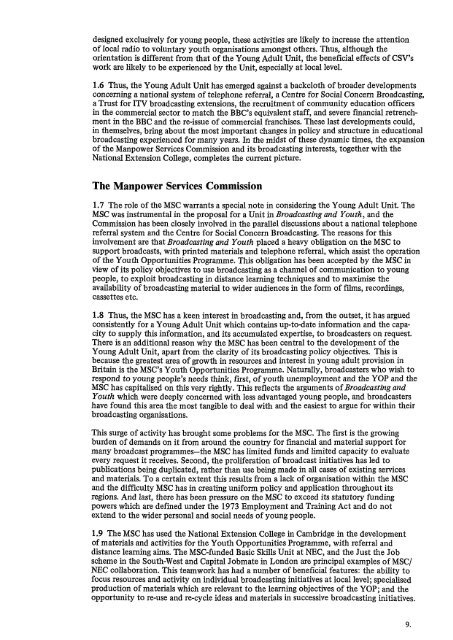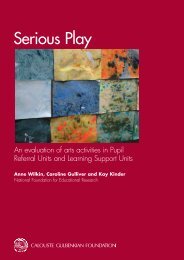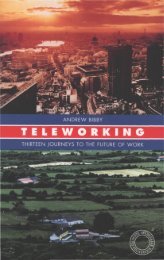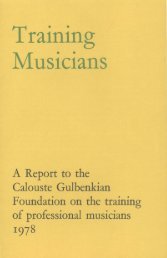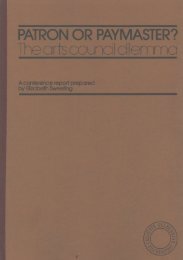Young People and Broadcasting - Calouste Gulbenkian Foundation
Young People and Broadcasting - Calouste Gulbenkian Foundation
Young People and Broadcasting - Calouste Gulbenkian Foundation
You also want an ePaper? Increase the reach of your titles
YUMPU automatically turns print PDFs into web optimized ePapers that Google loves.
designed exclusively for young people, these activities are likely to increase the attention<br />
of local radio to voluntary youth organisations amongst others. Thus, although the<br />
orientation is different from that of the <strong>Young</strong> Adult Unit, the beneficial effects of CSV's<br />
work are likely to be experienced by the Unit, especially at local level.<br />
1.6 Thus, the <strong>Young</strong> Adult Unit has emerged against a backcloth of broader developments<br />
concerning a national system of telephone referral, a Centre for Social Concern <strong>Broadcasting</strong>,<br />
a Trust for ITV broadcasting extensions, the recruitment of community education officers<br />
in the commercial sector to match the BBC's equivalent staff, <strong>and</strong> severe financial retrenchment<br />
in the BBC <strong>and</strong> the re-issue of commercial franchises. These last developments could,<br />
in themselves, bring about the most important changes in policy <strong>and</strong> structure in educational<br />
broadcasting experienced for many years. In the midst of these dynamic times, the expansion<br />
of the Manpower Services Commission <strong>and</strong> its broadcasting interests, together with the<br />
National Extension College, completes the current picture.<br />
The Manpower Services Commission<br />
1.7 The role of the MSC warrants a special note in considering the <strong>Young</strong> Adult Unit. The<br />
MSC was instrumental in the proposal for a Unit in <strong>Broadcasting</strong> <strong>and</strong> Youth, <strong>and</strong> the<br />
Commission has been closely involved in the parallel discussions about a national telephone<br />
referral system <strong>and</strong> the Centre for Social Concern <strong>Broadcasting</strong>. The reasons for this<br />
involvement are that <strong>Broadcasting</strong> <strong>and</strong> Youth placed a heavy obligation on the MSC to<br />
support broadcasts, with printed materials <strong>and</strong> telephone referral, which assist the operation<br />
of the Youth Opportunities Programme. This obligation has been accepted by the MSC in<br />
view of its policy objectives to use broadcasting as a channel of communication to young<br />
people, to exploit broadcasting in distance learning techniques <strong>and</strong> to maximise the<br />
availability of broadcasting material to wider audiences in the form of films, recordings,<br />
cassettes etc.<br />
1.8 Thus, the MSC has a keen interest in broadcasting <strong>and</strong>, from the outset, it has argued<br />
consistently for a <strong>Young</strong> Adult Unit which contains up-to-date information <strong>and</strong> the capacity<br />
to supply this information, <strong>and</strong> its accumulated expertise, to broadcasters on request.<br />
There is an additional reason why the MSC has been central to the development of the<br />
<strong>Young</strong> Adult Unit, apart from the clarity of its broadcasting policy objectives. This is<br />
because the greatest area of growth in resources <strong>and</strong> interest in young adult provision in<br />
Britain is the MSC's Youth Opportunities Programme. Naturally, broadcasters who wish to<br />
respond to young people's needs think, first, of youth unemployment <strong>and</strong> the YOP <strong>and</strong> the<br />
MSC has capitalised on this very rightly. This reflects the arguments of <strong>Broadcasting</strong> <strong>and</strong><br />
Youth which were deeply concerned with less advantaged young people, <strong>and</strong> broadcasters<br />
have found this area the most tangible to deal with <strong>and</strong> the easiest to argue for within their<br />
broadcasting organisations.<br />
This surge of activity has brought some problems for the MSC. The first is the growing<br />
burden of dem<strong>and</strong>s on it from around the country for financial <strong>and</strong> material support for<br />
many broadcast programmes—the MSC has limited funds <strong>and</strong> limited capacity to evaluate<br />
every request it receives. Second, the proliferation of broadcast initiatives has led to<br />
publications being duplicated, rather than use being made in all cases of existing services<br />
<strong>and</strong> materials. To a certain extent this results from a lack of organisation within the MSC<br />
<strong>and</strong> the difficulty MSC has in creating uniform policy <strong>and</strong> application throughout its<br />
regions. And last, there has been pressure on the MSC to exceed its statutory funding<br />
powers which are defined under the 1973 Employment <strong>and</strong> Training Act <strong>and</strong> do not<br />
extend to the wider personal <strong>and</strong> social needs of young people.<br />
1.9 The MSC has used the National Extension College in Cambridge in the development<br />
of materials <strong>and</strong> activities for the Youth Opportunities Programme, with referral <strong>and</strong><br />
distance learning aims. The MSC-funded Basic Skills Unit at NEC, <strong>and</strong> the Just the Job<br />
scheme in the South-West <strong>and</strong> Capital Jobmate in London are principal examples of MSC/<br />
NEC collaboration. This teamwork has had a number of beneficial features: the ability to<br />
focus resources <strong>and</strong> activity on individual broadcasting initiatives at local level; specialised<br />
production of materials which are relevant to the learning objectives of the YOP; <strong>and</strong> the<br />
opportunity to re-use <strong>and</strong> re-cycle ideas <strong>and</strong> materials in successive broadcasting initiatives.<br />
9.


